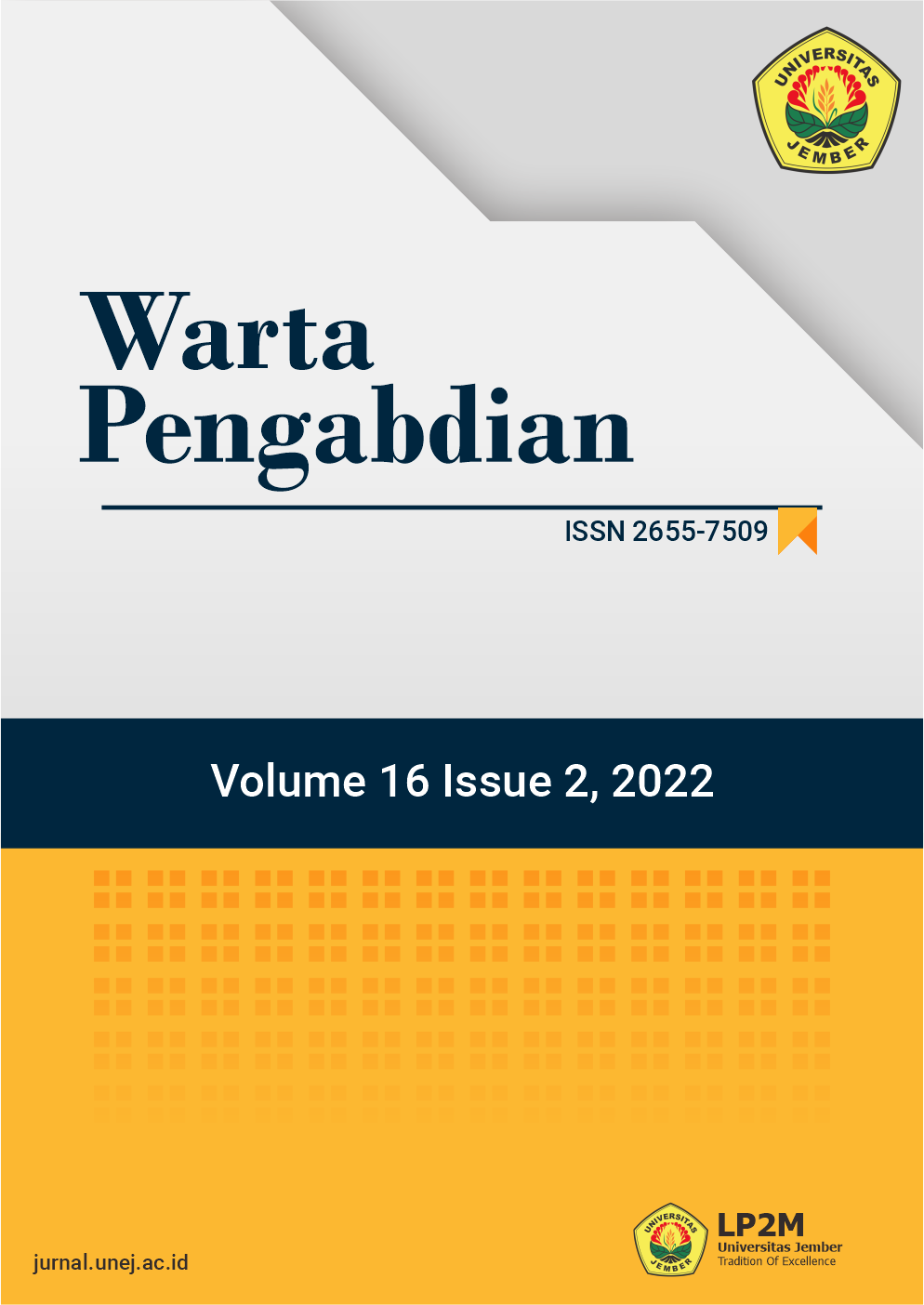Keterampilan Kolaborasi Guru Sekolah Dasar Untuk Keberhasilan Pendidikan Inklusif
DOI:
https://doi.org/10.19184/wrtp.v16i2.23395Keywords:
Keterampilan Kolaborasi Guru Sekolah Dasar, Pendidikan InklusifAbstract
Sistem pendidikan inklusif merupakan layanan pendidikan bagi anak disabilitas yang ditempatkan pada sekolah reguler bersama anak reguler lainnya. Secara filosofis, sebagian besar pendidik menganut konsep inklusi, namun secara pragmatis masih banyak yang menentang praktik yang sebenarnya. Kegiatan masyarakat ini bertujuan untuk memberikan informasi pada guru SD mengenai keterampilan dalam berkolaborasi untuk keberhasilan pendidikan inklusif. Kegiatan pengabdian dilakukan melalui kegiatan webinar dengan media zoom meeting. Hasil dari kegiatan ini mendapatkan apresiasi positif dari guru-guru SD terkait dengan pemahaman mengenai keterampilan yang diperlukan dalam melakukan kolaborasi untuk mensukseskan terlaksananya pendidikan inklusif di sekolah dasar.
Downloads
References
Bauwens, J., & Hourcade, J. J. (1995). Cooperative teaching: Rebuilding the schoolhouse for all students. Pro-Ed, 8700 Shoal Creek Blvd., Austin, TX 78757-689.
Chalfant, J. C., & Van Dusen Pysh, M. (1989). Teacher assistance teams: Five descriptive studies on 96 teams. Remedial and Special Education, 10(6), 49-58.
Curtis, M. J., & Meyers, J. (1988). Consultation: A foundation for alternative services in the schools. Alternative educational delivery systems: Enhancing instructional options for all students, 35-48.
de Boer, A., S. J. Pijl, and A. Minnaert. 2011. “Regular Primary Schoolteachers’ Attitudes Towards Inclusive Education: A Review of the Literature.†International Journal of Inclusive Education 15 (3): 331–353. doi:10.1080/13603110903030089
Fuchs, L. S., & Fuchs, D. (1991). Curriculum-based measurements: Current applications and future directions. Preventing School Failure: Alternative Education for Children and Youth, 35(3), 6-11.
Forlin, C., Earle, C., Loreman, T., & Sharma, U. (2011). The sentiments, attitudes, and concerns about inclusive education revised (SACIE-R) scale for measuring pre-service teachers’ perceptions about inclusion. Exceptionality Education International, 21(3).
Fuchs, D., Fuchs, L., Harris, A., & Roberts, P. H. (1996). Bridging the research-to-practice gap with mainstreaming assistance teams: A cautionary tale. School Psychology Quarterly, 11 (3), 244–266.
Idol-Maestas, L., & Ritter, S. (1985). A follow-up study of resource/consulting teachers: Factors that facilitate and inhibit teacher consultation. Teacher Education and Special Education, 8(3), 121-131.
Ilahi, Mohammad Takdir. (2013). Pendidikan Inklusif Konsep dan Aplikasi. Jogyakarta: Ar-ruzz Media
Gallessich, J. (1985). Toward a meta-theory of consultation. The Counseling Psychologist, 13(3), 336-354.
Garnida, Dadang. (2015). Pengantar Pendidikan Inklusif. Bandung : PT. Refika Aditama.
Gelzheiser, L. M., & Meyers, J. (1990). Special and remedial education in the classroom: Theme and variations. Journal of Reading, Writing, and Learning Disabilities International, 6(4), 419-436.
Graden, J. L., Casey, A., & Christenson, S. L. (1985). Implementing a prereferral intervention system: Part I. The model. Exceptional children, 51(5), 377-384.
Goodlad, J. I., & Field, S. (1993). Teachers for renewing schools. Integrating general and special education, 229-252.
Jayanthi, M., & Friend, M. (1992). Interpersonal problem solving: A selective literature review to guide practice. Journal of Educational and Psychological Consultation, 3(1), 39-53.
Kalyva, E., D. Gojkovic, and V. Tsakiris. 2007. “Serbian Teachers’ Attitudes Towards Inclusion.â€International Journal of Special Education 22: 31–36.
Lay Kekeh Marthan. (2007). Manajemen Pendidikan Inklusif. Jakarta: DIRJEN DIKTI.
Meyers, J., Gelzheiser, L. M., & Yelich, G. (1991). Do pull-in programs foster teacher collaboration?. Remedial and Special Education, 12(2), 7-15.
Moberg, S., and H. Savolainen. (2003). “Struggling for Inclusive Education in the North and the South: Educators’ Perceptions on Inclusive Education in Finland and Zambia.†International Journal of Rehabilitation Research 26 (1): 21–31. doi:10.1097/01.mrr.0000054970.12822.d6
Pandit, P. (2017). Effect of Gender, Academic Stream and Print Media Use on Educational Preferences of Senior Secondary School Students.
Phillips, V., & Mccullough, L. (1990). Consultation-based programming: Instituting the collaborative ethic in schools. Exceptional children, 56(4), 291-304.
Salend, S. J., & Duhaney, G. (2011). Chapter 1 Historical and philosophical changes in the education of students with exceptionalities. History of special education, 21, 1-20.
Stainback, W., & Stainback, S. (1984). A rationale for the merger of special and regular education. Exceptional children, 51(2), 102-111.
Tindal, G., & Marston, D. (1990). Classroom-based assessment: Evaluating instructional outcomes. New York: Merrill.
Wade, S.E. (2000). Inclusive Education: A Casebook and Readings for Prospective and Practicing Teachers – Chapter 4. Mahwah, NJ: Lawrence Erlbaum Associates.
Welch, M., & Sheridan, S. M. (1995). Educational partnerships: Serving students at risk. Wadsworth Publishing Company.
Winitzky, N., Sheridan, S., Crow, N., Welch, M., & Kennedy, C. (1995). Interdisiplinary collaboration: Variations on a theme. Journal of Teacher Education, 46(2), 109-119.



